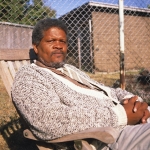PROLOGUE
Animals tame and animals feral
prowled the dark Ages in search of a moral:
the canine was Loyal, the lion was Virile,
rabbits were Potent and gryphons were Sterile.
Sloth, Envy, Gluttony, Pride—every peril
was fleshed into something phantasmic and rural,
while courage, Devotion, Thrift—every bright laurel
crowned a creature in some mythological mural.
Scientists think there is something immoral
in singular brutes having meat that is plural:
beasts are mere beasts, just as flowers are floral.
Yet between the lines there’s an implicit demurral;
the habit stays with us, albeit it’s puerile:
when Darwin saw squirrels, he saw more than Squirrel.
1. THE ANT
The ant, Darwin reminded us,
defies all simple-mindedness:
Take nothing (says the ant) on faith,
The PR men of bestiaries
eulogized for centuries
this busy little paragon,
nature’s proletarian—
but look here, Darwin said: some ants
make slaves of smaller ants, and end
exploiting in their peonages
the sweating brows of their tiny drudges.
Thus the ant speaks out of both
sides of its mealy little mouth:
its example is extolled
to the workers of the world,
but its habits also preach
the virtues of the idle rich.
2. THE WORM
Eyeless in Gaza, earless in Britain,
lower than a rattlesnake’s belly-button,
deaf as a judge and dumb as an audit:
nobody gave the worm much credit
till Darwin looked a little closer
at this spaghetti-torsoed loser.
Look, he said, a worm can feel
and taste and touch and learn and smell;
and ounce for ounce, they’re tough as wrestlers,
and love can turn them into hustlers,
and as to work, their labors are mythic,
small devotees of the Protestant Ethic:
they’ll go anywhere, to mountains or grassland,
south to the rain forests, north to Iceland,
fifty thousand to every acre
guzzling earth like a drunk on liquor,
churning the soil and making it fertile,
earning the thanks of every mortal:
proud Homo sapiens, with legs and arms—
his whole existence depends on worms.
So, History, no longer let
the worm’s be an ignoble lot
unwept, unhonored, and unsung.
Moral: even a worm can turn.
3. THE RABBIT
a.Except in distress, the rabbit is silent,
but social as teacups: no hare is an island.
(Moral:
silence is golden—or anyway harmless;
rabbits may run, but never for Congress.)
b.When a rabbit gets miffed, he bounds in an orbit,
kicking and scratching like—well, like a rabbit.
(Moral:
to thine own self be true—or as true as you can;
a wolf in sheep’s clothing fleeces his skin.)
c.He populates prairies and mountains and moors,
but in Sweden the rabbit can’t live out of doors.
(Moral:
to know your own strength, take a tug at your shackles;
to understand purity, ponder your freckles.)
d.Survival developed these small furry tutors;
the morals of rabbits outnumber their litters.
(Conclusion:
you needn’t be brainy, benign, or bizarre
to be thought a great prophet. Endure. Just endure.)
4. THE GOSSAMER
Sixty miles from land the gentle trades
that silk the Yankee clippers to Cathay
sift a million gossamers, like tides
of fluff above the menace of the sea.
These tiny spiders spin their bits of webbing
and ride the air as schooners ride the ocean;
the Beagle trapped a thousand in its rigging,
small aeronauts on some elusive mission.
The Megatherium, done to extinction
by its own bigness, makes a counterpoint
to gossamers, who breathe us this small lesson:
for survival, it’s the little things that count.





Comment form: